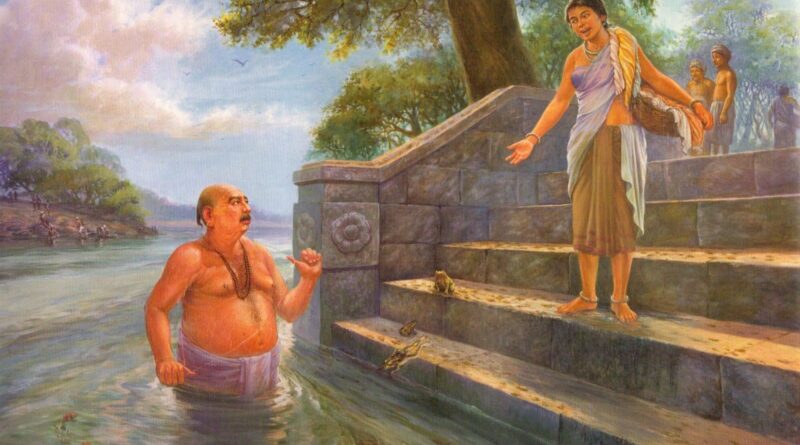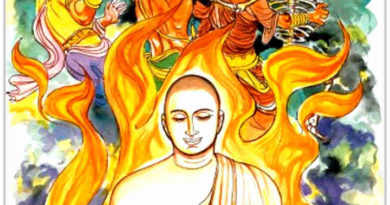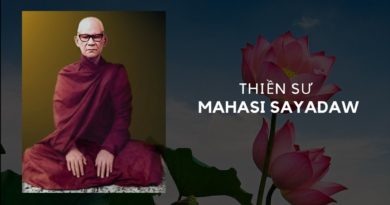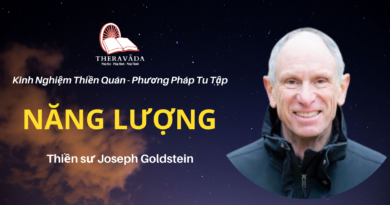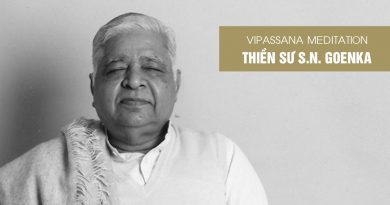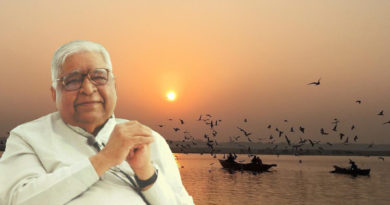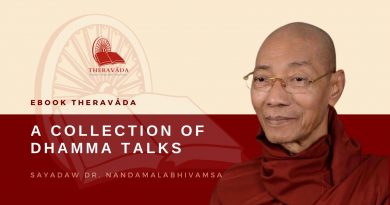Giving Appropriate Answers And Also Punishment As Necessary
Giving Appropriate Answers and Also Punishment as Necessary
Queen Māgandiyā sent her messengers to abuse the Buddha with these words…
“Monk Gautam, you are a thief! A fool! An Ignorant fellow! A camel! An ox! A donkey! An animal! You are bound for hell! You will not attain good states! Only bad states await you!”
The Buddha did not give them any answer because they were mere hirelings, slaves to their queen, using these abusive words according to her desire.
The Buddha neither refuted their statements nor made any attempt to make them understand. After all, they were unaware and only slaves to others. What could they understand?
But this does not mean that the Buddha never answered anybody. In fact, when anybody abused the Buddha and he knew that the person would be able to grasp the truth of the Dhamma, then he would give appropriate answers to that person. Some illustrations… .
Brahman Aggika Bhāradvāja
One day, the Buddha went to seek alms in the morning. At that time, preparations for a sacrificial ritual were underway in the house of the Brahman Aggika Bhāradvāja. When the Buddha, seeking alms from house to house, came in front of this house, the Brahman was enraged. Thinking that his auspicious sacrificial act would be polluted by the approach of this low person, he showed his contempt by yelling at him…
“You shaveling, remain where you are! You monk, remain where you are! You Vrishal [person of the lowest caste], remain where you are!”
The Buddha, finding him a proper recipient, explained to him why a person is called a Vrishal and what actions lead to someone becoming a Vrishal. The Buddha explained…
“A person who is hot-tempered and hostile, sinful and envious, who believes in false views and is a master of deception; who commits violence against creatures of all kinds; who has no compassion for living creatures; who besieges villages and small towns and ruins them; who is infamous as a tyrant; who steals the property of others in village or forest; who takes a loan and, when repayment is demanded, runs away saying that “I am not your debtor”; who kills a traveller with the intention of getting what he wants; who gives false testimony for the greed of money; who forcefully or lovingly lives with wives of relatives or friends; who in spite of being capable does not look after the maintenance of parents in their old age; who beats parents, siblings or in-laws or, overpowered by anger, speaks harsh words; who shows a wrong path when asked about the beneficial path and speaks in a round about manner; who conceals sinful deeds after committing them so that people do not come to know about them; who partakes tasty food when visiting the houses of others, but who does not treat others with due hospitality when they visit him; who deceives a Brahman, monk or any beggar by speaking lies; who resents and severely scolds Brahmans or monks who visit at meal times and does not give them anything; who, entangled with greed, tells lies to own any object; who praises himself and criticizes others and has fallen into disgrace because of false pride; who is cruel, miserly, a keeper of wicked desires, deceitful and shameless; who has no shame or fear of committing evil deeds; who declares himself an enlightened person despite his not being enlightened.
Such a liar is only a base person. He is lower than a Vrishal. Behold Brahman! I have described to you so many Vrishals.
No-one becomes a Vrishal by caste and no-one becomes a Brahman by caste. One becomes a Vrishal by one’s deeds and one becomes a Brahman by one’s deeds. Many among those who have taken birth in the homes of scholars versed in Vedas [early Indian sacred scriptures] are also found to be engaged in sinful deeds. Such individuals are reproached in this life and also fall to lower worlds after this life. Their birth can not save them from reproach and the pains of hell.”
In this way, although he abused the Buddha, he was still a suitable candidate, so the Buddha explained the Dhamma to him with loving kindness and compassion. By listening, his delusion about taking birth in a high caste was removed. He understood that one becomes high or low not due to one’s birth but due to one’s deeds.
“Na jaccā vasalo hoti, na jaccā hoti brāhmano;
kammunā vasalo hoti, kammunā hoti brāhmano”ti.
-No-one becomes a Vrishal by caste and no-one becomes a Brahman by caste.
-One becomes a Vrishal by one’s deeds and one becomes a Brahman by one’s deeds.
Brahman Bhāradvāja was benefited by these words of the Buddha. With reverence, he became a devoted disciple of the Buddha. The above couplet became famous and generated right awareness among the people.
Kasi Bhāradvāja
On one occasion, the Buddha was living in the Brahman village of Ekanāḷā. In the morning, the Buddha went to seek alms and reached the place where Kasi Bhāradvāja was working near his fields. Food was being distributed at that time.
The owner of the fields, Kasi Bhāradvāja, seeing the Buddha standing there, said with conceit…
“Recluse, I plough, and I sow, and, having ploughed and sown, I eat. You should also plough and sow, and, having ploughed and sown you should eat.”
On hearing this, the Buddha replied…
“I, too, Brahman, plough and sow; having ploughed and sown, I eat.”
“Oh Recluse! How do you profess to be a farmer? Where are your fields and farm implements?”
“Behold Brahman! Faith is my seed, austerity the rain, and wisdom is my yoke and plough. Modesty is the pole of my plough, mind is the harness, and mindfulness is my plowshare and goad. I am guarded in body and speech. I am restrained in terms of food. I make truth my sickle. Attaining the supreme goal of full enlightenment is my harvest. Exertion is my ox. Nibbāna [full deliverance] is the vehicle which draws me to a place where there is no trace of suffering. This cultivation gives the fruits of deathlessness and deliverance from all the miseries of life.
The Brahman was wise, full of merits earned in his past. He quickly understood the pure Dhamma. He said to the Buddha…
“Indeed you are the real cultivator. Clearly, your cultivation bears the fruit of deathlessness.” Saying this, he offered the Buddha a bowl with rice pudding.
The Buddha rejected it.
It is inappropriate to accept offerings of food received after a Dhamma discourse. Ignorant people will interpret this offering as a payment for the delivery of a Dhamma discourse but the Dhamma is priceless, its value cannot be assessed.
Immensely impressed by the beneficent words of the Buddha, Kasi Bhāradvāja Brahman became his follower. He duly received both the pabbajjā [ordination as a monk] and upasampadā [higher ordination] from the Buddha. In due course of time, through practicing Vipassana, he realized and attained the state of Arahant [highest level of enlightenment]. The fortunate Bhāradvāja Brahman, filled with gratitude, fulfilled the noble aim of his life.
Whenever, the Buddha came across incidents of superstitions and blind beliefs, he successfully made efforts to remove them. For example…
Bathing in the river does not wash away evil deeds
The Brahman Sundarika Bhāradvāja, seated near the Buddha, spoke to him thus…|
“Does Master Gotama go to the River Bāhukā to bathe?”
“What, good Brahman, is the River Bāhukā? What can the River Bāhukā do?”
“Truly, Master Gotama, many people respect the River Bāhukā, many people believe that the River Bāhukā gives purification. Many people wash away the evil deeds they have done.”
Then the Buddha addressed the Brahman Sundarika Bhāradvāja…
“A fool who has committed black deeds, may forever bathe in the rivers of Bāhukā, Gayā, Sundarikā, Saraswatī, Prayāgā and Bāhumatī, yet will not purify himself. What can the River Sundarikā bring to pass? What can the rivers Bāhulikā and Prayāgā do? They cannot purify an evildoer. Performing good deeds everyday is like a dip in the holy River Falgu and everyday is Uposatha [day of observances]; one who is pure in mind and who does good deeds has his observances perfect at all times.”
These teachings of the Buddha spread among his followers even during his lifetime and, in the centuries to follow, gave encouragement to the saints. Because of this, a saying became prevalent in the society…
“When the mind is pure, the purity of the River Ganges is always with you.”
The Buddha maintained silence in the face of abuse. But, whenever someone was able to understand, he explained the dhamma compassionately.
Offences of Pārājika [rules requiring expulsion from the Sangha]
Discipline was very strict for the Sangha [monastic community]. Buddha gave severe punishment for offenders breaking the rules. This was necessary to maintain the purity of the Sangha. There were many monks who transgressed these rules of conduct. The Buddha gave strict orders against them and they were expelled forever from the Sangha. The deeds, which were very serious in nature, were termed as Pārājika offenses and such offenders were expelled forever from the Sangha.
For example, some monks and nuns were expelled forever from the Sangha because they claimed to be Sotāpanna and Sakadāgāmī without having attained such levels of enlightenment. Someone found guilty of committing a Pārājika offense, is expelled from the Sangha and can never become a Bhikkhu [monk] or Bhikkhuni [nun] again.
Offences of Sanghādisesa [rules requiring meetings of the Sangha for the purification of monks and nuns)]
Thirteen kinds of faults were known as Sanghādisesa. Some Bhikkhus and Bhikkhunis committed major offenses while breaking the rules of the Sangha. Under these circumstances, they were given Sanghādisesa punishment. However, when they accepted their faults, sought pardon and promised not to commit such mistakes again, they were taken back into the Sangha. Sometimes, it also happened that offenders of Sanghādises were expelled from the Sangha for a certain time period enabling them to purify themselves through austerity and meditation. After serving the punishment for the decided period, that person was taken back into the Sangha.
This tradition was followed strictly by Reverend Gurudev Sayagyi U Ba Khin.
Sanghādisesa offence
A lady from our family entered the centre bearing myrtle which has an intense fragrance and polluted the atmosphere there. Gurudev ordered her to leave the centre immediately and instructed her never to put her foot in the centre again. After some time, she sought pardon from Gurudev and informed him that, on that day, there was some special festival, and she had come to the centre in her bridal outfit. She promised that she would not repeat this mistake in the future. At this, Gurudev pardoned her and permitted her to meditate in the centre in future. This was a type of Sanghādisesa offence for him, which was forgiven by him.
Offense
Two of his prominent disciples, one of whom was an officer in Civil Supply Department and the other was a high officer in the Accounts Department, committed big mistakes and Gurudev expelled them forever.
I am a Buddha son and Dhamma son of Gurudev Sayagyi U Ba Khin.
While developing Vipassana to its current extent, I also had to face such occasions, when mistakes were committed by some of the āchāryās. In some cases, the āchāryās accepted their mistakes and informed all the Teachers so that they may not commit such mistakes again. In these situations, I pardoned and permitted them to continue as Teachers. There were two such incidents.
Apart from these, some 2-3 other incidents also happened when the students strongly opposed my views on the Dhamma in clear terms and they did not even repent of it, so they were expelled forever.
But, yet I feel compassion for them as well. May they eventually understand their mistakes and accept the truth of the Dhamma. Their welfare lies in this.
I observe that some selfish people, working in collusion, want to spread the notion that I have become old and therefore should retire.
I am certainly physically weak but mentally I am as fit and alert as ever. On finding no fault with me to justify my leaving, and also observing that I am taking all my decisions on my own, they then made my son Sriprakash the scapegoat. Whatever decisions I have taken both in the earlier days and also in the present, have neither been unduly influenced by Sriprakash nor by anyone else. All the decisions have been taken of my own accord.
When no fault is found in me, a wrong notion is spread by painting my son Sriprakash as an intermediary saying that I take all my decision under his influence. There cannot be a bigger lie than this, but these few separatists use this as their only pretext to defame me again and again saying that I am unable to take decisions of my own accord and that all of my decisions are taken by Sriprakash.
I very well understand the intentions of these few selfish people, that whatever Dhamma work accomplished by me during the last forty three years should get sidelined on the pretext of Sriprakash so that they can take possession of this great mission of Dhamma. I will never let these enemies of the Dhamma succeed.
While I am alive, I will keep the flame of the Dhamma alive, and what to talk of Sriprakash, I cannot be unduly influenced by anybody. May these few selfish people also understand the Dhamma and save themselves from committing evil deeds. Leaving them apart, may none of my millions of devoted Dhamma sons and daughters get misled by them! Everyone’s benefit lies in this.
Source: VRIDhamma.org

